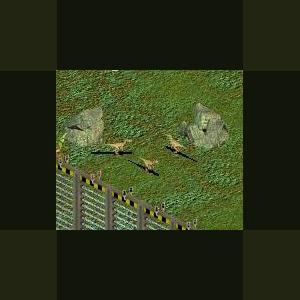About This File
Juravenator is a genus of small (2.5 feet long) coelurosaurian dinosaur, which lived in the area which would someday become the Jura mountains of Germany, 150 million years ago.
Juravenator was originally published as a member of the family Compsognathidae, making it a close relative of Sinosauropteryx and Sinocalliopteryx, for which there is fossil evidence of a downy, feather-like covering, yet a patch of fossilized Juravenator skin shows only normal dinosaur scales, with no sign of feathers at all. While it may simply have never had feathers, paleontologist Mark Norell suggest that the presence of scales on the Juravenator tail could mean a number of things:
Juravenator could have lost its feathers secondarily on at least some parts of its body, like some modern, partially featherless birds.
Feathers could have evolved more than once in different types of dinosaur.
Since the only known Juravenator skeleton is juvenile, it could be that this species only grew a significant covering of feathers as they aged, or lost feathers seasonally.
The feathers might simply have not been preserved in this specimen. "Feathers are really just difficult things to preserve," Norell says, though Luis Chiappe, director of the Dinosaur Institute at the Natural History Museum of Los Angeles County points out that the fossil skin does not show the follicles normally associated with dinosaur skin that has lost its feathers.
Additionally, subsequent studies have found problems with the initial study that placed Juravenator among the compsognathids. Rather than grouping it with Sinosauropteryx and other compsognathids, Butler et al. found that it was not a compsognathid, but rather a basal member of the group Maniraptora. Studies conflict on whether or not compsognathids belong to this later group or are more primitive, though all other maniraptoran skin impressions also show evidence of feathers.
The fossil, found in 1998 by amateur paleontologist Klaus-Dieter Weiß in a lime pit near Eichstätt, had been nicknamed Borsti in German, a name commonly given to bristle-haired dogs, on the assumption the creature was endowed with bristly protofeathers.



Recommended Comments
There are no comments to display.
Create an account or sign in to comment
You need to be a member in order to leave a comment
Create an account
Sign up for a new account in our community. It's easy!
Register a new accountSign in
Already have an account? Sign in here.
Sign In Now